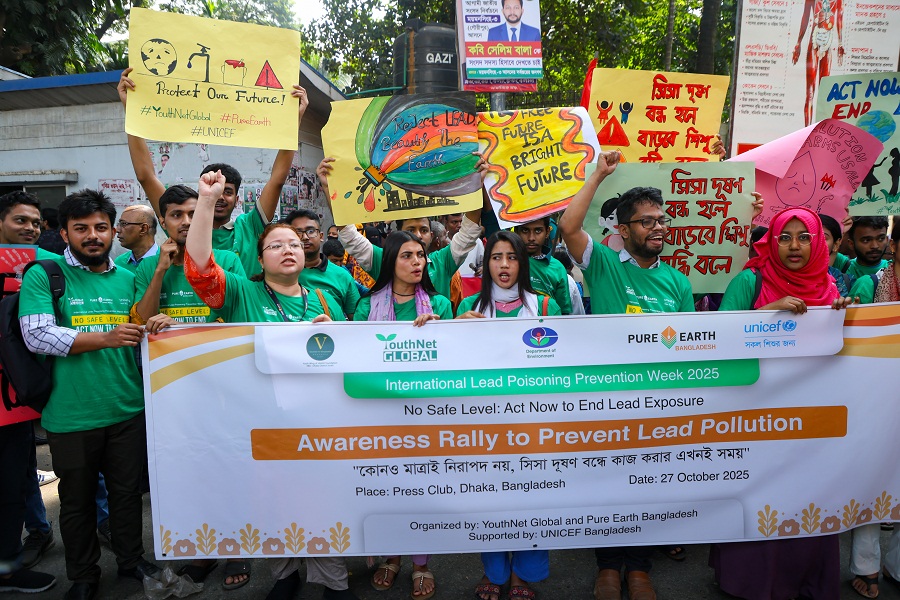
Published :
Updated :

Under the global theme "No Safe Level: Act Now to End Lead Exposure," YouthNet Global and Pure Earth Bangladesh, in coordination with the Department of Environment and with support from UNICEF, jointly organised a public awareness rally, human chain, and discussion session at the Dhaka Press Club to mark International Lead Poisoning Prevention Week 2025.
The event is part of an ongoing month-long nationwide campaign across all 64 districts of Bangladesh, engaging 18 additional district-level partner organisations to strengthen collective action against lead pollution.
More than 150 participants took part in the rally, including volunteers from YouthNet Global, representatives from Pure Earth Bangladesh and UNICEF, the general public, youth and civil society organisations, local NGOs, students, government officials, policymakers, environmental activists, social workers, and media professionals.
Participants carried banners and placards and chanted slogans such as "End Lead Pollution, Save Future Generations." The event aimed to raise awareness of the dangers of lead exposure and urged more vigorous enforcement of laws and regulations. Leaflets and stickers on lead prevention were distributed among participants.
Md. Maruf Mohaimen, Research Officer, Waste and Chemical Management, Department of Environment, and Focal Person for Lead said: "Preventing lead pollution is a national priority, and the government is fully committed to safeguarding public health and the environment. We are actively coordinating with communities, NGOs, and industry partners to enforce regulations, promote safe practices, and raise awareness, ensuring that every child and citizen can live in a lead-free, healthy Bangladesh.”
Emphasising the importance of involving people from all walks of life in efforts to prevent lead pollution, Pure Earth Bangladesh's Country Director, Mitali Das, said: "All elements of our environment—soil, water, and air—are being contaminated with lead. This toxic heavy metal has entered our bodies and the food chain through polluted soil, unsafe lead-acid battery recycling, and lead-containing consumer products. As part of Pure Earth's mandate to combat lead pollution and protect public health, we are promoting environmentally sound management of lead, remediating contamination sources, strengthening government capacity and policy advocacy for effective action, and raising nationwide awareness by mobilising youths to build a lead-free Bangladesh.”
Bangladesh ranks fourth globally among the most lead-contaminated countries, with around 36 million children—nearly 60% of the total—showing elevated blood lead levels.
Lead poisoning impairs children's intelligence, learning, and behavior, while in adults, it increases heart disease risk, causing an estimated 140,000 deaths annually. Lead in pregnant women's blood can lead to miscarriage, stillbirth, and other health risks. The economic toll is severe, costing the nation about $28.6 billion USD each year, or 6–9% of GDP. Significant sources of contamination include unsafe lead-acid battery recycling, paint, aluminium and ceramic cookware, spices, toys, cosmetics, fish feed, and many others.


 For all latest news, follow The Financial Express Google News channel.
For all latest news, follow The Financial Express Google News channel.